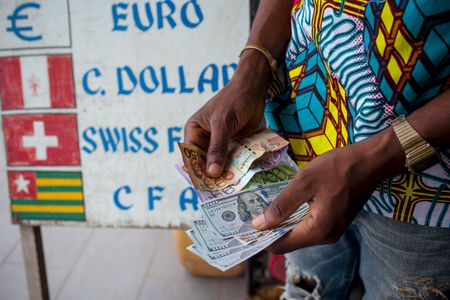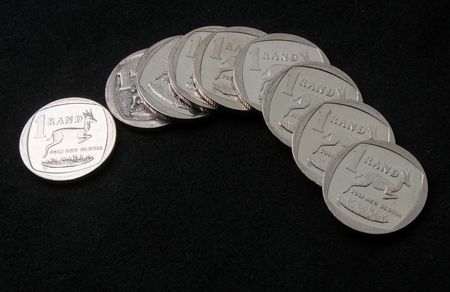By Karin Strohecker
LONDON (Reuters) -Ghana’s sovereign dollar bonds tumbled on Monday after Moody’s slashed the country’s credit rating, saying it faced an increasingly difficult task of addressing liquidity and debt challenges – a move sharply criticised by the government.
Bonds issued on international capital markets fell across the curve with some longer-dated debt tumbling nearly 3 cents in the dollar and trading at just over 70 cents, Tradeweb data showed.
Moody’s cut its rating from B3 to CAA1 late on Friday, saying Ghana’s debt was subject to “very high credit risk”, and estimating that interest payments would absorb more than half of government revenues for the foreseeable future.
The move follows a downgrade by Fitch in January, which lowered Ghana’s rating to B- from B, with a negative outlook, indicating more pressure could be ahead.
However, also on Friday, peer S&P Global Ratings affirmed Ghana’s rating at B- with a stable outlook.
Ghana, one of West Africa’s largest economies, slammed Moody’s action.
In a statement dated Sunday, the finance ministry said it had appealed against downgrade and said the rating agency’s concerns were largely addressed by fiscal consolidation measures outlined recently in its 2022 budget “anchored on debt sustainability and a positive primary balance.”
Analysts had warned that fast-rising debt levels and choking interest payments were putting Ghana at growing risk of a debt crisis, with debt forecast to reach 85% of gross domestic product.
“In our view, the authorities’ fiscal consolidation plans — now including a reduction of up to 20% of projected 2022 expenditures — are insufficient to address Ghana primary fiscal issue of high borrowing costs,” Bojosi Morule at Goldman Sachs said in a note on Monday.
Ghana said earlier this year it planned to issue 24.5 billion Ghanaian cedi ($3.92 billion) of bonds in the first quarter of 2022. However, with international bond yields above 10% since the fourth quarter and currently at nearly 13%, Ghana is effectively shut out of financial markets.
Its local 10-year sovereign bonds yield nearly 22% – their highest level since the pandemic market rout in early 2020.
($1 = 6.2500 Ghanaian cedi)
(Reporting by Karin Strohecker; Editing by Saikat Chatterjee and Tomasz Janowski)









